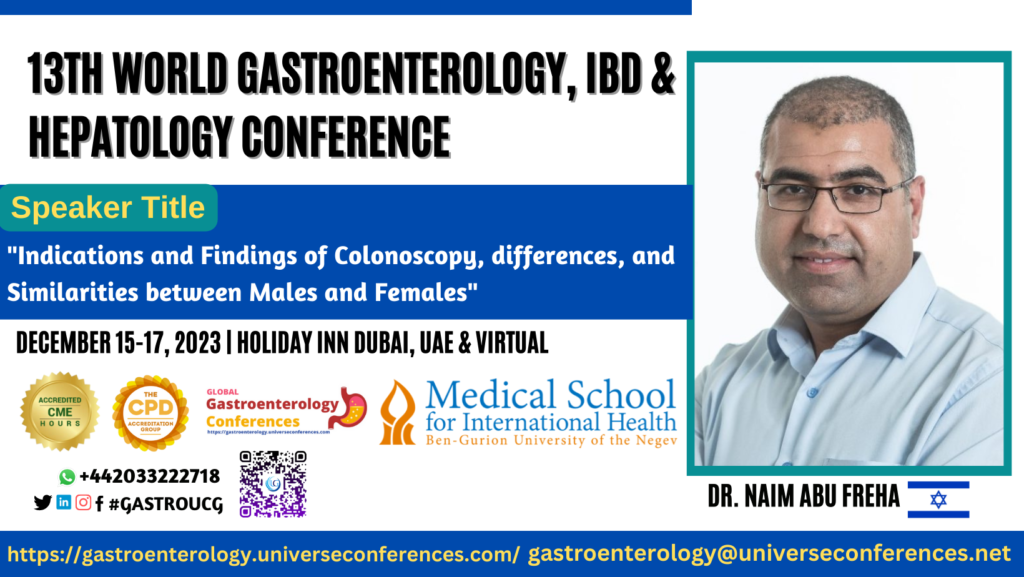
Biography
Dr. Naim Abu-Freha is a gastroenterologist at Soroka University Medical Center’s Institute of Gastroenterology and Liver Diseases. Dr. Naim serves on the Israeli Gastroenterology Association’s Committee and is the Director of the Gastroenterology Institute at Assuta Hospital in Beer-Sheva. He specialises on gastroenterology and hepatology in general, as well as colorectal cancer genetic syndromes. He has studied several themes in gastroenterology and hepatology, as well as concerns concerning the Bedouin Arab population in southern Israel. Dr. Abu-Freha is also one of the founders of the Arab Medical Associations in the Negev (AMAN) and its first Chairman since 2015.
Research Interests
Gastroenterology, Colorectal Cancer, and IBD in Bedouins
Education and Training
Tuebingen University, Germany, M.D.
Internal Medicine Residency at Soroka Medical Centre
Gastroenterology Residency at Soroka Medical Centre
Introduction:
Colorectal Cancer (CRC) is the third most common cancer worldwide. Only scant data is known regarding specific ethnicities and minorities. The Arab population in Israel is about 20% of the population; the Arab population in Israel has unique historical, social, and cultural characteristics. The Arab society in Israel has undergone major and rapid changes in lifestyle in the last five decades, from agricultural to urban society, with changes in nutrition, a high rate of smoking among men, a low rate of physical activity, and a high rate of consanguinity, which affect the health of the population.
Aim
We aimed to investigate the general characteristic, comorbidities, and all cause-mortality of CRC among the Arab population compared to the Jewish population.
Methods
CRC patients, according to ICD-10 codes were retrospectively included between the years 1999 and 2021. Data regarding demographics, age at diagnosis, comorbidities, and mortality were collected. Data were retrieved using the MdClone platform from the largest Health Maintenance Organization, “Clalit” in Israel. The risk factors and comorbidities were compared between young patients (≤50 years) compared to the other patients.
Results
: 61,679 CRC patients were included in the present study, 4891 (7.9%) of Arab ethnicity and 56,788 of Jewish ethnicity. Age at diagnosis is significantly younger Among Arab (62.5±14 vs 70.8±13 years, p<0.001), with a higher males proportion of 51.3% vs 49.2%, p=0,005). 21.3% of the Arab CRC patients were diagnosed at age 50 or younger, compared to 8% of Jewish patients, p<0.001. Significant differences were found in family history of CRC and smoking (3.6% vs 6.2%, 34.9% vs 30%, respectively. Higher rates of diabetes mellitus and obesity were found among Arab patients (37.6% vs 27.5%, and 36% vs 21.4%, p<0.001), while lower rates of ischemic heart disease, hypertension and chronic kidney disease (9.7% vs 12.6%, 45.6% vs 53.7% and 8.1% vs 10.3%, p<0.001, respectively.
All-cause mortality was lower among patients of Arab ethnicity (49.6% vs 60.8%, p<0.001) with younger age at death (70.9±14.5 vs 79.8±11.8, p<0.001).
Conclusions
disparities in risk factors, comorbidities, and all-cause mortality were found in different ethnic groups; special consideration is needed for specific ethnicities and minorities according to the colon cancer characteristics
Keywords: Colon Cancer, Ethnicity, Arab
